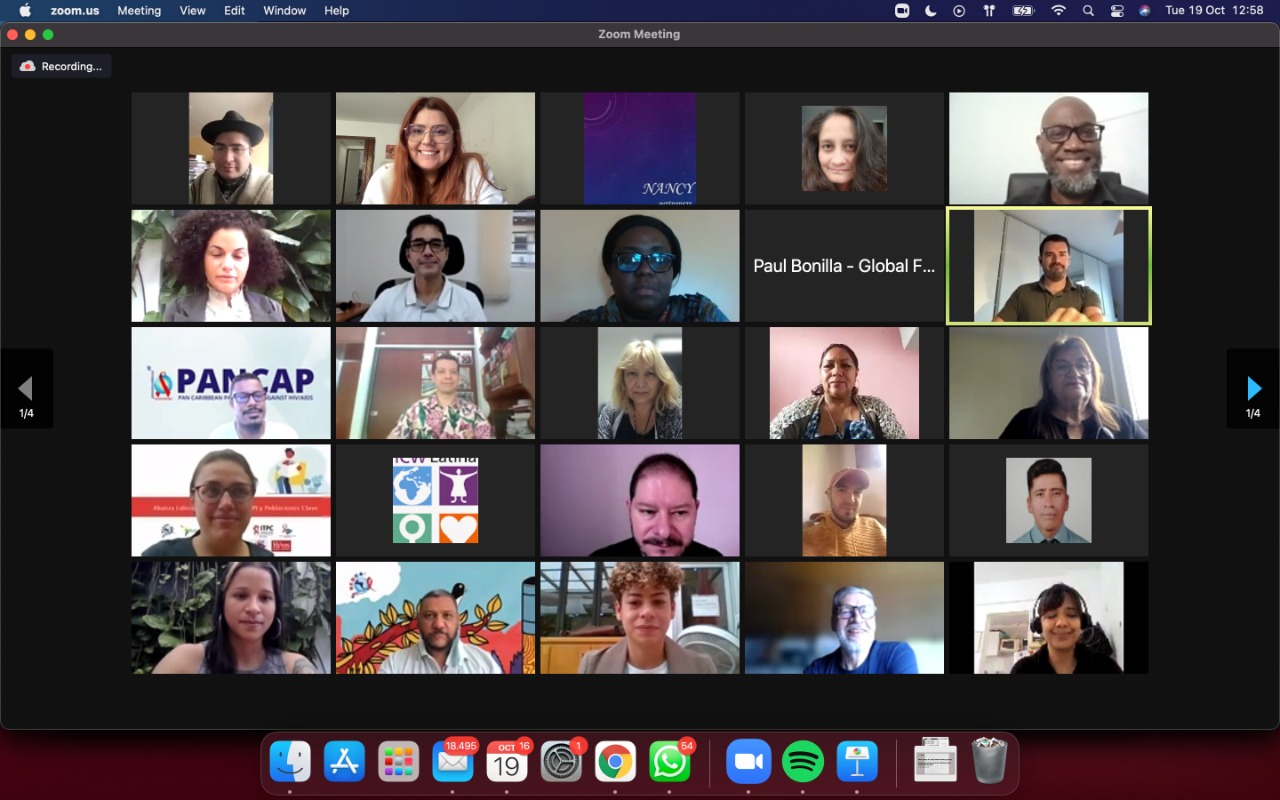
Multi-Stakeholder approach needed for engaging Key Populations in the end AIDS AgendaLatin America and Caribbean (LAC) Regional Platform facilitated experience exchange with key stakeholders
TUESDAY 19 OCTOBER 2021: The Latin America and Caribbean Regional Platform (Plataforma Regional) facilitated an experience exchange between LAC Multi-country HIV grants. The exchange allowed implementers from Alianza Liderazgo en Positivo (HIV Positive Leadership) or ALEP Hivos and the CARICOM-PANCAP-CVC-COIN multi-country grants to share success stories and experiences to enhance implementation effectiveness and foster improvements.
The experiences shared focused on grant implementation during the last two (2) years.
Mr Ivan Cruickshank, Executive Director, Caribbean Vulnerable Communities Coalition (CVC), presented on behalf of the PANCAP-CVC-COIN multi-country grant. The primary objective of the grant was to provide sustainable prevention, treatment and care services for key populations in the Caribbean. The sub- recipients included the PANCAP Coordinating Unit, CVC, El Centro de Orientación e Investigación Integral (COIN), Pan American Health Organization (PAHO), Caribbean Public Health Agency (CARPHA), Caribbean Med Labs Foundation (CMLF), Caribbean Regional Network of People Living with HIV/AIDS (CRN+) and the Cuban National Center for Sex Education (CENESEX).
The ten (10) beneficiary countries included Antigua and Barbuda, Barbados, Belize, Cuba, Dominican Republic, Guyana, Haiti, Jamaica, Suriname and the Republic of Trinidad and Tobago.
The grant aimed to achieve social contracting with Civil Society Organisations (CSOs), government commitment to resources for HIV, updated integrated guidelines for HIV programming, among others.
The challenges highlighted by Mr Cruickshank included coordination and implementation in a virtual environment, slow responses from countries due to the focus on COVID-19, and prioritisation of other public health issues over HIV. He explained that COVID-19 country restrictions also hindered the movement of goods and services. Mr Cruickshank indicated that CVC staff were diverted to other activities due to the pandemic, which slowed the implementation of grant deliverables. In addition, CSOs scaled back operations due to COVID-19 and grant implementation staff being quarantined caused further delays.
Mr Cruickshank also underscored that several beneficiary countries had political barriers to grant implementation.
Mr Hache Barreda from ALEP Hivos explained that the grant aimed to increase domestic funding for interventions aimed at People Living with HIV (PLHIV) – including key subpopulations with HIV–and the mobilisation of resources for organisations of PLHIV; the promotion of the institutionalisation of political, technical and financial strategies to reduce inequalities in access to comprehensive health services for PLHIV in the Latin American region, and the promotion of strategic information on PLHIV–including key subpopulations with HIV–for decision-making processes.
Priority countries included Bolivia, Colombia, Costa Rica, Ecuador, El Salvador, Guatemala, Honduras, Panama, Paraguay and Peru.
Mr Barreda indicated that the challenges experienced included political barriers preventing CSO organisations from implementing interventions and COVID-19 country restrictions, including lockdowns and limited movement. He also highlighted that there are challenges creating alliances with CSO organisations due to COVID-19.
Dr Rosmond Adams, Director, PANCAP, praised the LAC Regional Platform for facilitating the interaction between the Caribbean and Latin America grant implementers. He underscored the importance of sharing experiences related to challenges experienced by CSOs and navigating political barriers for improved grant implementation.
Dr Adams highlighted that the common factor that emerged from the experiences is a need for a multi-stakeholder approach to grant implementation that involves CSOs, governments, youth, faith and community leaders and opinion leaders.
Participants posed questions regarding the challenge of a lack of “digital literacy” among CSOs and limited access to facilities and knowledge on using virtual platforms effectively.
Mr Cruickshank agreed that limited digital literacy among CSOs was a challenge with grant implementation. He explained that training programmes within the grant were designed with that in mind, including virtual support and mentorship. He also explained that incentives were provided, including providing mobile phone data to CSOs for their participation.
Mr Cruickshank proposed approaching grant implementation from a broader quality of life perspective. He explained that the approach involves considering the economic challenges experienced by key populations, especially in light of the jobs lost due to COVID-19. “Alleviating lack of income, limited access to data and technology and other challenges related to the quality of life is integral to the successful engagement of key populations”, stated Mr Cruickshank.
He explained that the lack of human rights for key populations hinders the implementation of grant objectives. He proposed utilising a broader human rights approach to ensure that key populations are included in the conversation at all human rights forums.
The experience exchange concluded with participants calling for a multi-stakeholder approach for grant implementation, including the full involvement of governments, key populations, youth and community leaders.
– ENDS –
WHAT IS PANCAP?
PANCAP is a Caribbean regional partnership of governments, regional civil society organisations, regional institutions and organisations, bilateral and multilateral agencies and contributing donor partners established on 14 February 2001. PANCAP provides a structured and unified approach to the Caribbean’s response to the HIV epidemic, and coordinates the response through the Caribbean Regional Strategic Framework on HIV and AIDS to maximise efficient use of resources and increase impact, mobilise resources and build the capacity of partners.
What are the Global AIDS Strategy 2021–2026 targets and commitments?
If targets and commitments in the strategy are achieved:
- The number of people who newly acquire HIV will decrease from 1.7 million in 2019 to less than 370 000 by 2025
- The number of people dying from AIDS-related illnesses will decrease from 690 000 in 2019 to less than 250 000 in 2025.
- The goal of eliminating new HIV infections among children will see the number of new HIV infections drop from 150,000 in 2019 to less than 22,000 in 2025.
What are the 95-95-95 Targets for ending AIDS?
- 95% of People Living with HIV know their HIV status;
- 95% of people who know their status on treatment; and
- 95% of people on treatment with suppressed viral loads.
HELPFUL LINKS:
Global AIDS Strategy 2021–2026, End Inequalities, End AIDS
https://pancap.org/pancap-documents/global-aids-strategy-2021-2026-end-inequalities-end-aids/
Caribbean Regional Strategic Framework on HIV and AIDS (CRSF) 2019-2025
https://pancap.org/pancap-documents/caribbean-regional-strategic-framework-2019-2025/
